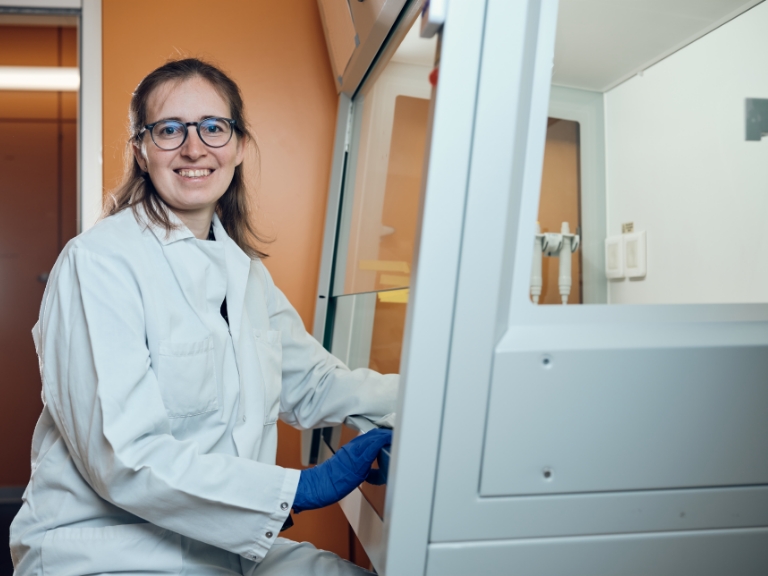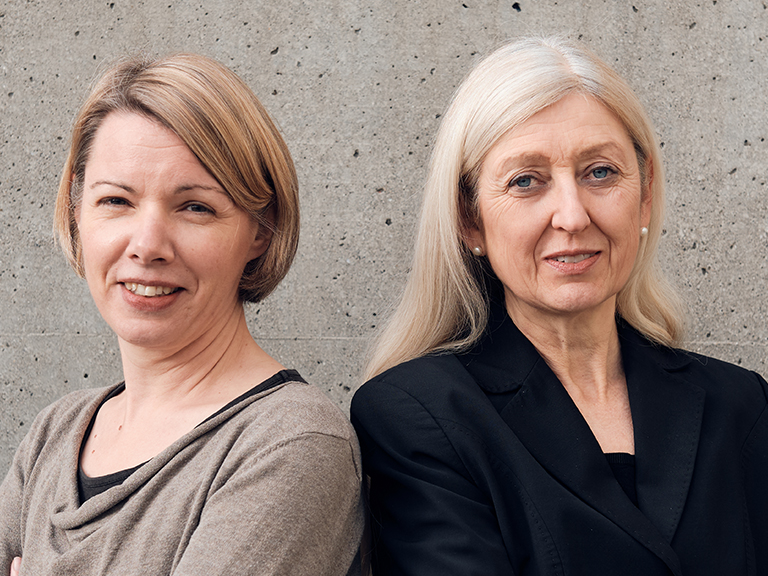Free daycare center places
KIHOB: Great commitment to smaller daycare center groups
The Foundation for Childcare in the Bern University Area (KIHOB) has been running daycare centers for students and employees of the University of Bern for over 55 years. As Managing Director Aline Bamberger explains, the foundation constantly adapts its offerings to meet varying needs.

Aline Bamberger: Because we can tailor our offerings more closely to the needs of parents who are studying or working at the University of Bern or the University of Teacher Education (PHBern). One of our material strengths is our flexibility: Our notice periods for daycare places are shorter than usual which means parents can rebook the amount of childcare and the days before each semester.
We also step in to help with short-term bottlenecks. If a child falls ill or a parent who is the primary carer is unable to work, our “Plan B” offer comes into play: one-to-one care for the child at home by one of our specialists, Monday to Thursday between 9 a.m. and 6 p.m. This applies not only to parents whose children have a daycare place with us, but also to all members of the University. These assignments require a lot of organization on our part. But we are proud to be able to help out in such situations.
Unlike public daycare centers in the City of Bern, we do not accept “kiBons”, i.e. the childcare vouchers from the residential municipalities. Nevertheless, our prices are comparable to those of public institutions. On the one hand, when calculating the tariff – unlike the “kiBon” – we only take income into account, not assets as well. In addition, we have 29 levels to differentiate the tariff according to salary. And if drastic changes occur within a semester, such as unemployment, the tariff level can be adjusted. On the other hand, the University of Bern and PHBern support us with contributions.

That’s why we offer conference organizers the option of booking childcare with KIHOB and offering it to participants free of charge. The children are usually looked after in an adjoining room, so the parents are always close by. If only one or two children are registered, the parents take their child to one of the three campuses, depending on the capacity on the day, and pick them up once the conference has come to an end. In these cases, the conference organizer covers the costs.

Until before the pandemic, the KIHOB was constantly fully booked and we kept waiting lists. However, the coronavirus pandemic has helped working from home achieve a breakthrough, with the result that many parents of pre-school children have been looking after their children at home ever since. The pandemic also strengthened the network of relatives and neighbors who look after the children. In itself, this is a positive development. However, the consequence is that some children are cared for at different locations during the week, of which only one day remains with us. We have adapted to the needs and reduced the minimum occupancy to one day.
“It makes educational sense to have a child who is looked after by someone else taken care of in the same place more often.”
Aline Bamberger
From an educational point of view, however, it would make more sense to have children cared for in the same place more often so that they can settle in better and establish relationships. It is also a disadvantage for us that children today often start kindergarten at the age of four. After all, it is low-birth-rate cohorts that are currently infants.
We have reduced the size of the group slightly and the care staff accordingly. Nevertheless, the children at KIHOB receive above-average levels of childcare: The 78 children are served by a 34-strong specialist staff, eight apprentices and two people doing community service. Otherwise, we remain true to our educational orientation and work with what are called educational and learning stories (BULG): We monitor the child’s developmental stages and design the play and learning environment accordingly. The portfolio with photos and written information created in this way is useful for the parents, but later also interesting for the child themselves.
The fact that we consistently speak the dialect has also proven successful. Foreign-language parents in particular appreciate it when their child is able to communicate in the local dialect in kindergarten, which makes it easier for them to find their way around everyday life.

For our group of kindergarten and school children, childcare is also possible during school vacation and on days away from school. In 2026, we will only be fully closed for one week in summer and the week between Christmas and New Year.
Students are particularly happy that they can flexibly adjust the after-school care days at the start of the semester. Lecturers appreciate the possibility that they do not have to cancel their daycare place in the event of a longer stay abroad, but can keep it for half the price. This guarantees the child a place in the same group after their return.
And all members of the University are happy to take advantage of an extra day of childcare – this is charged in the same way as the days that have been firmly booked. After all, the geographical proximity of our three locations to the University is ideal: You drop off your child with us on the way to the University, or a mother comes over at lunchtime to breastfeed her child.
We are repeatedly praised for our warmth. However, what is particularly important to our customers is a good staff-to-child ratio, as this is central to the well-being of the child. Let’s take the “Raspberries” group: Three experts and one or two apprentices are available at the same time for the eleven children. This is attractive not only for the children, but also for the staff.
Of course, we also have hectic times, especially during the acclimatization phases after the summer holidays. But it is not a permanent state. In most cases, it is possible to focus on an individual child. This is probably the reason why apprentices repeatedly ask us for a permanent position once they have completed their training. Word of mouth is important at KIHOB. In spite of the general shortage of specialist staff, no vacancy has ever been vacant. Incidentally, men are increasingly working for us, and at Casa Tutti Frutti they already account for 20% of the workforce. Male attachment figures are valuable for the children, and a mixed team also improves the working atmosphere. And motivated staff are an essential factor in ensuring that the children thrive.
KIHOB
At the suggestion of the Association of Women Academics in Bern (VBA), professional childcare was established in 1969 for the children of students and employees of the University of Bern. The University daycare center was initially organized as an association and therefore not part of the University. In 2012, the association became the Foundation for Childcare in the Bern University Area (KIHOB), which is sponsored by the University of Bern and the PHBern. For the University and the PHBern, childcare at both universities is an important tool of gender equality.
Work/life balance at the University of Bern
Balancing studies, family and work can be challenging. That is why the University of Bern offers a wide range of support services to ease this balance: from child-friendly infrastructure to flexible childcare options.
Subscribe to the uniAKTUELL newsletter

Discover stories about the research at the University of Bern and the people behind it.

